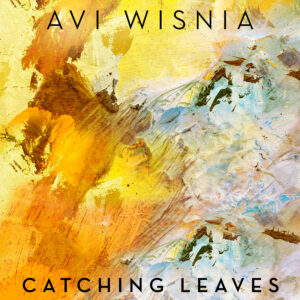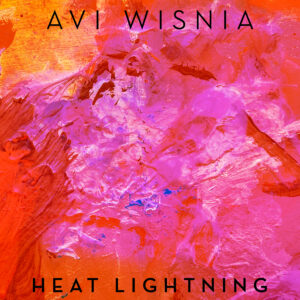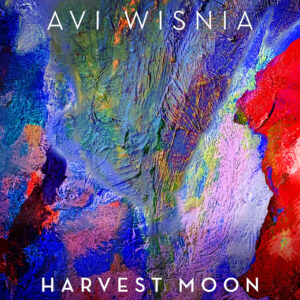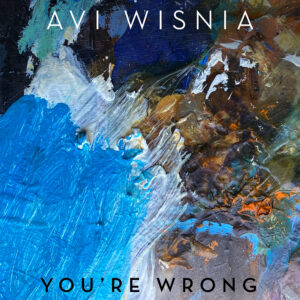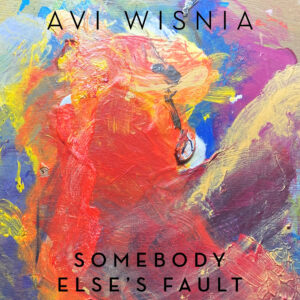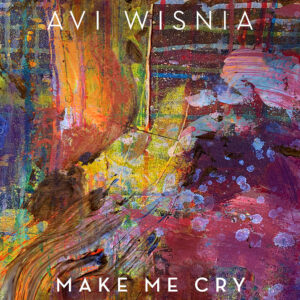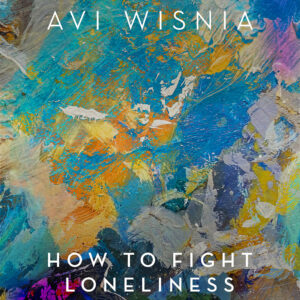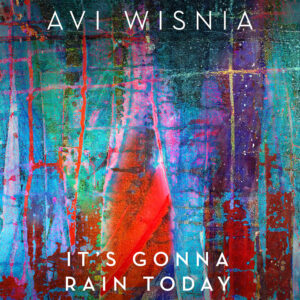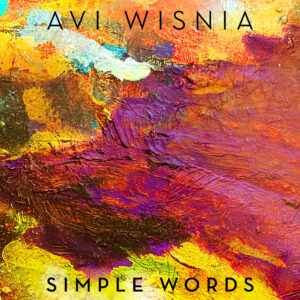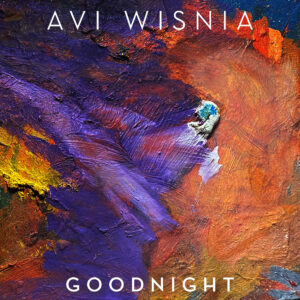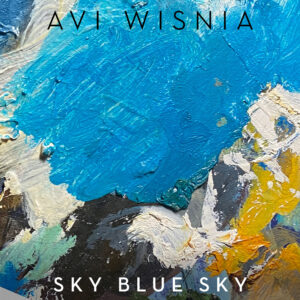The Story Behind The Songs
The words behind the words and music of Catching Leaves.
Some thoughts and stories Behind The Song for each track of the album.
[with special edition palette artwork by Joseph McCarthy]
On a bench in one of my favorite parks in South Philly is where I put this song together. I was sitting with a lot of grief and sadness, feeling lost, and coming from a very melancholy place. As the breeze picked up, I watched the leaves lift and swirl off the ground in a beautiful chaos and I was inspired to write a song that felt and sounded like that.
I had been trying to find a way to move forward with purpose after experiencing a lot of loss, particularly the death of my brother. Making the album helped me process a lot of those feelings. We spend a lot of our lives searching, struggling, pining, grasping wildly for things beyond our reach. Especially with the final lyric and the conclusion of the song, Catching Leaves is a reminder to slow down, to take a moment, to be still amidst the chaos all around us. Sometimes, it’s when you stop searching that you find what you are looking for.
This song became the title track because it really sets the mood for the entire album, like setting a temperature on a thermostat, like getting the carrot-ginger soup to start your meal. Because a lot of the songs on this album revolve around images of nature and the way our lives are mirrored in the natural world, Catching Leaves gives you a taste of what is to come. It also captures a lot of the themes that run throughout the whole album: trying to find a way forward when you feel hopeless, trying to find order in things beyond our control, trying to cope with the passage of time and find acceptance in change. Trying to make sense of the world around us can be a lot like trying to catch leaves in the wind.
“Heat Lightning” is a dark & stormy bop that simmers under the surface. It’s about that tension you have with the people who are closest to you, the people you share a history with. Old anger and issues left unresolved can reappear at any moment.
When I was a kid up at summer camp (shout out to Kunkletown’s own Camp Harlam and my bunkmate Seth Kroll, who also helped write this tune), heat lightning was this natural phenomenon that I thought I experienced a lot on those dry summer nights. I did not realize at the time that those streaking bolts of light were really just remnants of a drifting storm, far off in the distance, and not from something close at all. The stormy reference is reflected in the eerie yet organic acoustic tones and conjures up a past that still very much rumbles & reverberates in the present.
3. Come Home To
“Come Home To” is a different kind of love song.
Over the past few years, I have been able to witness a lot of my childhood friends grow up to become parents for the first time. I get to see them transition into this totally new phase of life. I remember when the very first friend in our group had a kid, I went to visit him to meet his new baby boy. As his son was sleeping, we took a walk outside discussing what fatherhood had changed for him and how his priorities had changed since his son was born. A few years earlier, he had finally gotten his dream job, a job that fulfilled him, a job he loved. And then, once his child arrived, he found himself regretting leaving home every day. The career he had devoted himself to was now taking him away from his son, but that career was also making it possible to provide for him. It made me reflect on this time in our lives, when our priorities were shifting. How do you make time in your life for the things you love, for the people you love? What happens when things change?
I wanted to write a song from my friend’s perspective, the perspective of a new parent trying to balance work and family, trying to sort out what your priorities are. There’s also a moment in the bridge of the song that I thought was really important to include: “Everybody pretends, but we know not what we do.” It is another layer of that dynamic, that speaks to the way we’re all making our way blind in the world. We’re all stumbling on, none of us knowing what the right answers are and which path is the best way forward, so we pretend we know what we’re doing but none of us do.
4. Harvest Moon
Harvest Moon is one of the most timeless romantic songs.
I first started performing Harvest Moon at the suggestion of guitarist Toru Takiguchi. I could tell it connected deeply with audiences, because it became one of the most requested songs that people wanted to hear at my concerts. This is in no small part due to the power of the original Neil Young version, the way it conjures mood and memory, and lends itself to interpretation. I knew Harvest Moon would be one of the few cover songs I would bring on to the Catching Leaves album. It also fit perfectly with the very Autumn vibes of this whole record.
The Harvest Moon gets its name by being the full moon nearest the Autumn Equinox. For several evenings during this seasonal transition, the moonrise comes swiftly after sunset, resulting in an abundance of bright light early in the warm autumn evenings. The arrangement of the song itself hangs in the balance, somewhere between steady Americana and free-flowing jazz, like light suspended between the waning day and the coming night. Playing the piano solo in the studio felt like slow-dancing in an open field.
In the original Neil Young version, Linda Ronstadt provides the backing vocals. In this version, I provide my own backing harmonies, by vocalizing through a kazoo. If you listen real close, you can hear the faint kazoos howling at the moon.
5. You’re Wrong
Can you hear the Hall & Oates on this one? I was channeling the duo when I came up with the beginnings of You’re Wrong on piano. There were a few phrases that auditioned to be the main words of the chorus, but “You’re Wrong” just felt right. The next part was figuring out what was going to be wrong.
This song was borne out of the politics of the past few years, which really disproved the idea that just letting time pass will bring about progress and change. Things can always get worse. Complacency keeps us from fighting for a better world, for a more fair and just world. Every time you speak out, you move the needle. So don’t get too comfortable, comfort is overrated. Keep growing, keep speaking up, keep finding ways to help. There is always something to fight for. And anytime anybody tries to lull you into thinking everything is fine, you know what to tell them.
I’m gonna be honest. Sometimes I don’t know what I’m writing about.
There are lines I wrote for this song, and I don’t exactly know what they mean. I remember reading an interview where Chris Cornell explained the lyrics to his song “Black Hole Sun” (a song I love to jazz up and play). He claimed he wrote the song almost as an exercise to play with lyrics. “Lyrically it’s probably the closest to me just playing with words for words’ sake, of anything I’ve written. I guess it worked for a lot of people who heard it, but I have no idea how you’d begin to take that one literally.”
I think about that a lot. I want what I write to have meaning. And yet, sometimes I just write things because they sound good. Or, I find the meaning in them later. But it’s actually not my job to make sense of my songs. It’s yours.
Overall, I know where I ended up. This song gets at a larger theme that runs throughout the album: struggling through life when you feel like you’re at the mercy of circumstance beyond your control. Sometimes you just want to blame everyone else. Other people made this mess, why should i clean it up?
And that part about getting out of bed in the morning? That part is very literal. Mornings are the worst.
7. Make Me Cry
I had a damn good time singing this one. It felt like a release.
I was afraid to come out for a long time. Afraid of how my friends and family would react, afraid of what people around me would say, afraid of what people I didn’t even know would think. I’m fortunate. My family and friends welcomed me, and because I was being honest and finally letting them know who I am, they were able to love me because of it.
Even after I came out, though, I was worried about those I might have hurt, hurt because I had kept a big part of myself hidden from them for so long. It is inevitable that we hurt people we love by hiding parts of ourselves, even when we have good reason to, even when the world makes us believe that we should. It can feel like the world is telling you that you deserve to be punished if you reveal who you are, while at the same time telling you that you deserved to be punished if you don’t. But you can’t hide away forever, not if you want to fully live your life. And those that love you don’t want you to hide away, either. Not really.
Writing the song “Make Me Cry” was a way of exploring the feelings that come with that journey of self-discovery and what it means to be open with the people who think they know you the most.
And the truth is, if everyone deserves honesty – and they do – then let’s make this a society where everyone feels ok to be themselves, and to reveal themselves to us in their own time, when they’re ready. We can all spare each other a lot of crying.
I’m so grateful to everyone in my life who welcomed me when I told them I am gay. Let’s promise each other: that the world will be ready to receive you when you figure yourself out.
Wilco, but make it smoky, sexy jazz.
There are a few artists that write about papering over sadness with a smile, and Charlie Chaplin is usually front of mind. The medicine they prescribe is something like ‘Fake It Til You Make It.’ But there’s a bitterness to the words by Jeff Tweedy in “How To Fight Loneliness” that has made this song stay with me. He is self-aware in his self-destruction; that feeling that you can’t show the world what’s really going on, so you just have to let it eat you up inside. I wanted to take Wilco’s loneliness and color it with my own – changing it from a melancholy green to a deeper blue. I’ve known what it’s like to feel lonely for so long, you start to despair. And when you are standing there, neck-deep in despair, there is comfort in identifying with a song that someone else wrote about loneliness: you know you’re not alone in feeling that way. Just smile all the time.
Of all the songs on this album, this one got the Fisher-Price xylophone.
I was an adult living in New York when I got a phone call about the funeral. A childhood friend had died suddenly in a car accident and there was going to be a memorial in our hometown elementary school auditorium. All my old classmates and teachers came back. It’s an inappropriate time for a reunion, but that’s what it was.
There are sounds on this track that will pull you in different directions. The brushes on the drum swishing like windshield wipers. The stringed-bow pulling achingly at the tones of the vibraphone. And my childhood Fisher-Price xylophone, a toy I played when I was 3 years old, found in the basement of my childhood home. This xylophone also made an appearance on my last album, on the song ‘Sink’. But on this song, it has a different meaning. It’s a little out of place, child-like and slightly off key. Its placement makes me think of childhood relationships and the ways in which we eventually grow apart as we grow older.
When I got that somber phone call, I wasn’t sure if I would go to the funeral. But I went. I went to be there for the family, and for the community, and for my old friend who I barely knew. We grew apart, but I came back when she died. Does that mean anything? I think I have settled on this: when you have an opportunity to go to something like a funeral, you should go. Even if you’re not sure it will mean anything.
10. Simple Words
The simple words can be the hardest to say.
I remember vividly where I was when I wrote this song. I was visiting my older brother at his house in Philadelphia, waiting for him to get ready. I don’t remember where we were going, but I was fully expecting not to be leaving anytime soon – he always kept people waiting. So while I waited, I sat at the old family piano that he had moved into his living room, and tinkered around with a melody and eventually settled on the refrain you hear repeatedly throughout this song. No words, just a little melody line. It sounded so simple. So I repeated that word “simple” over the notes until other words came to join it.
Years later, my brother would be diagnosed with a brain tumor. He would slowly lose his ability to use his legs, then his hands, and eventually his words. I had no idea when I wrote this song how much I would need that reminder myself, that we should say the important things to the people we love while we can, while they are still here.
My brother died in 2012 and I still wonder about all of the things he never got to say, and all of the things I’ll never be able to say to him. Even the simple words. Especially the simple words. I’m grateful to my brother for so many things, including making me wait that one day years ago, so that I could have time to sit down at the piano and write this song.
Sometimes I think I was born in the wrong decade. So I wrote a song to take me to a different one. Music as time travel. Inspired by songwriters like Cole Porter and movies like “Singin’ In The Rain,” I wanted to conjure up a hazy romance of fantasy and imagination, a nostalgia for something you haven’t really experienced yet. If you’ve ever fantasized about someone you’re pining for coming to sweep you off your feet, allow yourself to stay there. Live in the fantasy. Give in to a black-and-white dance sequence during the trumpet solo. Let the movie in your mind play out just a little bit longer.
12. Dindi
A re-imagining of a bossa nova classic, presented in two parts.
The opening introduces the familiar refrain of the world-famous jazz standard, originally composed by the bossa nova king himself Antônio Carlos Jobim, with English lyrics later added by Ray Gilbert. You think you’re going to hear a classic rendition, until the beat drops. I love taking songs in unexpected turns and the sparse R&B back beat helps create even more space, which evokes something beyond romance. It becomes ethereal, otherworldly. It makes you feel like you are floating away.
I wanted saxophone to join me on this track, paying homage to the classic bossa nova recordings of João Gilberto and Stan Getz who made “The Girl From Ipanema” so famous. In our recording, saxophonist Victor North channels the laid-back breathiness of Getz so perfectly.
“Dindi” (pronounced ‘Jin-Jee’ in Portuguese) is actually a reference not to a person or a lover, but to a farm in Brazil named Dirindi, a place that Tom Jobim used to visit, a place whose natural beauty inspired many of his songs. And so, as much as it is a deeply-felt love song, Dindi has no gender, no form, only that which you give it. Dindi brings out the best in you, makes you want to be better, makes you want to give yourself completely in full devotion. As the song goes on, it gets more and more spacey, more fantastical, less tethered to the ground. Let your love flow, like a river that can’t find the sea.
13. Goodnight
I lingered on the words of this one for a while. The culmination and amalgamation of many breakups. Not everyone is meant to stay in your life forever. Even long after their presence has left you, their voice echoes in your brain and you can’t help but be changed. It’s bittersweet, moving on. Goodnight is about allowing things to end so you can have a new beginning.
14. Sky Blue Sky [Bonus Track]
This song sounds like Brazil but it was born, like me, in New Jersey.
My memories of summer travels inspired this breezy samba song. Playing music on the Brazilian Ipanema beach, hiking along the Italian Amalfi coast, sailing in the San Francisco bay – these images came flooding back to me as I lay on the sand one cold day in Cape May, New Jersey, trying to work through some songwriter’s block. The perfect blue sky above inspired the stage for a story of subtle attraction at a samba party on international waters.
Although I grew up outside of Philadelphia, I fell in love with the sounds of samba and bossa nova early on, and I started to explore what that connection meant for me as a songwriter. (I gave a TED Talk about it!) When I was finally able to visit and perform in Brazil a few years back, I met Bruno Migliari, the talented bassist and producer from Rio de Janeiro.
When I returned to the US after my tour, Bruno and I made plans to work together again. Collaborating remotely is so commonplace now, but at the time, recording with someone in another country seemed like an impossible feat to me. I have always found technology slightly terrifying. Finding a way to record something organic between Philadelphia and Rio was intimidating but also really exciting, and also integral to the song because the sound I dreamed of had its roots firmly in Brazil.
The band gathered in Bruno’s 8VB studio: Marco Lobo on percussion, Bernardo Bosisio on guitar, Bruno on bass. I recorded my parts at home in Philadelphia (special thanks to Dan Levine with the production there and guiding me through the technophobia).
Reminiscent of music by artists like Bebel Gilberto and Chico Buarque, Sky Blue Sky blends Brazilian rhythms while instruments like pandeiro, cavaquinho, and melodica playfully intertwine. Originally released as a single in 2015, I am so happy to finally give it a home among the collection of songs that is my latest album. I love listening back to this song and forgetting that we were not all in the same room, let alone the same country. In the end, this cross-continental collaboration transcends geographical borders and captures the promise of possibility as clear as a sky blue sky.
